Command - OQMG - Regimental Office - Colonels of the Corps, Emeritus
Colonels of the Corps, Emeritus
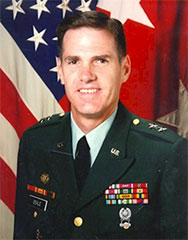
Major General, Retired
Richard E. Beale, Jr.
Colonel of the Corps, Emeritus
June 2011 – June 2016
Major General Beale graduated from Wake Forest University in Winston Salem, North Carolina, in June 1964, with an Economics degree. A distinguished military graduate in the ROTC program, he was commissioned a Second Lieutenant in the Quartermaster Corps. During his 32 years of active duty service General Beale served in a wide variety of assignments from platoon to Department of the Army level including tours in Korea, Vietnam and Europe. He commanded companies in the 13th Supply and Service Battalion in Korea (1967) and the 4th Supply and Transportation Battalion in Vietnam (1969-70); and was Commander of the 142nd Supply and Service Battalion, 3rd Support Command, United States Army Europe (1979-82). He also commanded the 3rd Armored Division Division Support Command in Europe (1986-88). He served with noted success as a Logistics Staff Officer and Executive Officer at Department of the Army Deputy Chief of Staff for Logistics; as an Assignment Officer at the Army Military Personnel Center; Chief of Staff/G4, Eighth U.S. Army, Korea; Chief of Staff, C-4/J-4, United Nations Command, US Forces Korea, Combined Forces Command, Seoul, Korea; and Chief of Military Plans and Operations, and Concepts and Doctrine divisions at Army Materiel Command. General Beale served as Director of the Defense Commissary Agency (DECA), the nation's ninth largest grocery chain, with annual sales of $5.5 billion, from November 1992 through September 1999. He retired from active duty in September 1996, but at the request of senior Defense Department officials continued to head DECA as a Senior Executive Service civilian for another three years.

Major General, Retired
Robert K. Guest
Colonel of the Corps, Emeritus
June 2008 – June 2011
After graduating from North Georgia College ROTC in June 1963, Major General Guest entered service as an Infantry Second lieutenant. As a Company Grade Officer, he served as a Platoon Leader with the Berlin Brigade in Germany (1963-65) and commanded the 600th Quartermaster Company, XVIII Airborne Corps at Fort Bragg, NC (1968-69).
General Guest served three separate tours in Southeast Asia - as a Battalion level Operations Officer and MACV advisor in South Vietnam, in 1966 and 1970, respectively; and Division Chief with the Defense Attaché Office in Laos, in 1975, at war's end. Other significant positions included S3 and Executive Officer with the 4th Infantry Division DISCOM at Fort Carson, Colorado; also Commander of the 1st Supply and Transportation Battalion and Assistant Chief of Staff/G4 for the 1st Infantry Division, Fort Riley, Kansas.
Following graduation from the Naval War College in 1984, General Guest served three years in Office of the Deputy Chief of Staff Logistics, then commanded the 101st Division Support Command at Fort Campbell, Kentucky (1987-89). He was Deputy Commanding General, 21st Theater Army Area Command (TAACOM) in Germany when Iraqi forces invaded Kuwait, and went to Southwest Asia in September 1990 to become Deputy CG of the 22d TAACOM for Operation Desert Shield, and later served with the XVIII Airborne Corps during Operation Desert Storm.
Afterwards, General Guest commanded the 3rd Corps Support Command in Wiesbaden, Germany, and was Deputy Chief of Staff for Logistics, United States Army Europe and Seventh Army, from 1991 to 1993. Then to Fort Gregg-Adams where he became the 43rd Quartermaster General of the Army, and, prior to his retirement in 1998, Commander of the US Army Combined Arms Support Command. He has been described as a Log Warrior second to none and "the consummate Quartermaster."
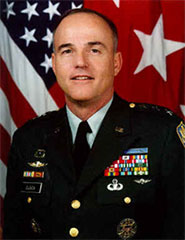
Lieutenant General, Retired
John J. Cusick
Colonel of the Corps, Emeritus
June 2004 – June 2007
Lieutenant General Cusick was born in Scranton, Pennsylvania. His military career began in May of 1964, when he received a commission as a Second Lieutenant from the University of Scranton. A distinguished military graduate, his military education continued with the Infantry Officer Basic Course, Airborne School, Rigger School, Quartermaster Advanced Course, the Command and General Staff College, and the Army War College. He is a CAPSTONE graduate and attended Harvard Senior Managers in Government. He also holds a Bachelor of Science Degree in American History from the University of Scranton, a Master of Arts Degree in American History from the University of Nebraska-Lincoln, and a Master of Arts Degree in Management from Webster College in St. Louis, Missouri.
He has held a wide variety of command and staff positions culminating with duties as the Director for Logistics, the Joint Staff Pentagon. Previous to this assignment, he was assigned as the Commanding General of the US Army Aviation and Troop Command in St. Louis, Missouri. Other key assignments include duty as Director for Supply and Maintenance, Office of the Deputy Chief of Staff for Logistics; Commanding General, US Army Quartermaster Center and School and the 42nd Quartermaster General, US Army at Fort Gregg-Adams, Virginia; Commanding General, Defense Personnel Support Center, Philadelphia, Pennsylvania; Commander, 1st Corps Support Command, XVIII Airborne Corps, Fort Bragg, North Carolina; Commander, 82nd Airborne Division Support Command, Fort Bragg, North Carolina; and Commander, 407th Supply and Service Battalion, 82nd Airborne Division, Fort Bragg, North Carolina.
General Cusick served in a wide variety of important assignments. In September 1967, he was assigned as an assistant G-4 of the 101st Airborne Division, Fort Campbell, Kentucky, and was deployed with the Division to the Republic of Vietnam that December. He commanded the 623d Quartermaster Company (AER&D) in the Republic of Vietnam from June to November 1968. In 1969, he was assigned to the ROTC detachment at the University of Nebraska at Lincoln where he taught American Military History and Logistics. During the period 1972-74, General Cusick served as a logistics advisor to the Ethiopian Army in Addis Ababa, Ethiopia.
On his return to the United States he assumed the duties of Executive Officer for the 407th Supply and Service Battalion, 82d Airborne Division and then served as the Division Parachute Officer from 1974 to 1976. He was then assigned to the Troop Support and Aviation Materiel Readiness Command in St. Louis, Missouri as the Readiness Project Officer for Air Delivery Equipment from November 1976 through August 1978.
In 1979 he was assigned to the Defense Contract Administration Services Management Area in Towson, Maryland. His next assignment was as a logistics management staff officer of the Rapid Deployment Joint Task Force at MacDill Air Force Base, Florida to which he was assigned upon the units activation in February 1980. In August 1985 he became the Deputy Director of Procurement and Production at the Troop Support Command in St. Louis, Missouri. From February 1987 through January 1990, he returned to Fort Bragg as Commander of the Division Support Command, 82d Airborne Division, and Commander, 1st Corps Support Command, XVIII Airborne Corps. In January 1990, he assumed command of the Defense Personnel Support Center, Philadelphia, Pennsylvania. from July 1991 to July 1993, he commanded the U.S. Army Quartermaster Center and School, Fort Gregg-Adams, Virginia, as the 42nd Quartermaster General.
A great trainer and motivator, as the 42nd Quartermaster General of the Army General Cusick expanded field training exercises at the Quartermaster School, and employed such phrases as "Logistics Warrior" and "THINK WAR" to cultivate a sense of pride and esprit - and improved readiness - among all Quartermaster Soldiers.
From August 1993 through June 1995, he served in Washington, D.C. as Director for Supply and Maintenance, Office of the Deputy Chief of Staff for Logistics, returning to St. Louis, Missouri in June 1995, as Commanding General, US Army Aviation and Troop Command. He was promoted to Lieutenant General and appointed as the Director for Logistics, the Joint Staff in April 1996. He retired on 31 May 1998 with over 34 years of active military service.
A dedicated "Red Hat," General Cusick had five key rigger assignments over the course of his illustrious career, and left an indelible mark on that critical area of Quartermaster responsibility. He also authored a host of joint logistics plans and doctrine at the very highest level of the defense establishment, plans that are in use today, and will no doubt help guide logistics practices for decades to come. Indeed one senior logistician has maintained that: "General Cusick was arguably the best planner of his generation."
General Cusick’s awards and decorations include the Distinguished Service Medal (with Oak Leaf Cluster), the Defense Superior Service Medal, the Legion of Merit (with 2 Oak Leaf Clusters), the Bronze Star, the Defense Meritorious Service Medal (with 2 Oak Leaf Clusters), the Joint Service Commendation Medal, the Army Commendation Medal (with Oak Leaf Cluster), the Expert Infantryman Badge, the Master Parachutist Badge, and the Parachute Rigger Badge.
General Cusick was inducted as a Distinguished Member of the Quartermaster Regiment in 1991 (Charter Year) and the Quartermaster Hall of Fame in 2004.

Major General, Retired
Charles R. Henry
Colonel of the Corps, Emeritus
June 2001 – June 2004
Upon completing ROTC and graduating from Middle Tennessee State University, Major General Henry was commissioned a Second Lieutenant in 1959. Throughout his career of nearly 33 years, General Henry held a variety of important Quartermaster, mission related, command and staff positions from small units in the field to the large Defense Contracting Management Command, a joint Department of Defense agency. Overseas assignments included tours in Vietnam, Europe and Saudi Arabia. During the 1980s he served four times in the Defense Logistics Agency, most notably as an acquisitions and contracting expert. He was also selected to become the Army's first Competition Advocate General (a position newly established by Congress), where he reported directly to the Secretary of the Army. He reduced Army costs by 30 percent and increased competitive contracting from 38 percent to 65 percent.
Many of the creative policies and contracting procedures he established while serving as a Quartermaster Officer have become institutionalized nation's and the Corps' betterment.

Lieutenant General, Retired
Arthur J. Gregg
Colonel of the Corps, Emeritus
June 1998 – June 2001
Lieutenant General Gregg served in two wars and held key Quartermaster command assignments in the United States, Korea, Japan, Europe and Vietnam. In his final assignment as Deputy Chief of Staff for Logistics in Washington, D.C., he exercised staff responsibility for the logistical support of the entire US Army. His actions in the areas of laundry and bath, food service, and provisions for clothing and equipment ensured the well-being of thousands of soldiers. He also represented the US in the North Atlantic Treaty Organization and other multinational logistics organizations and conferences.
General Arthur James Gregg was born on May 11, 1928 near Florence, South Carolina. He obtained his elementary education in South Carolina, but moved to Newport News, Virginia during high school where he observed the military lifestyle.
In 1945, he enlisted in the United States Army at the age of 17. The Army sent General Gregg to Germany as a medical laboratory technician, but due to low demand, he transferred to the position of unit supply sergeant. After spending three-and-a-half-years in the Army, he applied and was accepted into Officer Candidate School and left as a First Lieutenant due to his academic excellence in 1950. In 1965, General Gregg graduated “Summa cum laude” from Command and General Staff College at Fort Leavenworth, Kansas and simultaneously obtained a Bachelor of Science from Saint Benedict College. General Gregg was assigned to many positions and locations through his time in the Army. These include the 403rd Quartermaster Depot, Camp Hakata, Japan as Post Quartermaster, Army Reserve units in Carlisle Barracks, Pennsylvania, Quartermaster Advance Course in Fort Gregg-Adams, Virginia, Army Materiel Command in Washington, D.C., and 3764th Quartermaster Direct Supply Company. In 1965 General Gregg assumed command of the 96th Quartermaster Direct Support Battalion in South Vietnam. His Battalion was awarded the Meritorious Unit Citation and Lieutenant General Gregg was awarded the Legion of Merit for their outstanding effort. Returning to the US in 1967, he was assigned to Joint Petroleum Office, Logistics Directorate, US European Command where he was responsible for the communication between the US and NATO petroleum logistics. General Gregg was promoted to Brigadier General in 1972 prior to taking control of the Army and Air Force Exchange System in Germany. In 1977, President Jimmy Carter nominated General Gregg for the position of Director of Logistics, Organization of the Joint Chiefs of Staff, and approved his nomination to Lieutenant General. In that post General Gregg’s goal was to improve the readiness of the armed forces. This position led to the acceptance of the position of Deputy Chief of Staff, Logistics for the US Army in 1979. General Greg also attended the Harvard University John F. Kennedy School of Government concentrating in Executive Program in National Security. General Gregg retired from the US Army in 1981.
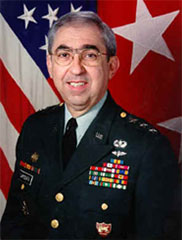
Lieutenant General, Retired
Joseph S. Laposata
Colonel of the Corps, Emeritus
June 1996 – June 1998
Lieutenant General Joseph S. Laposata was commissioned a Second Lieutenant in the US Army after receiving a Bachelor of Science Degree in Biology from Indiana University of Pennsylvania. He also holds a Master of Science Degree in Agricultural Economics from Cornell University. His military education includes the Industrial College of the Armed Forces and the U.S. Army Command and General Staff College.
He held many key command and staff positions within the military His key assignments include Chief of Staff of the Southern European Task Force in Vicenza, Italy; Deputy Chief of Staff for Logistics, U.S. Army Europe and Seventh Army; and Commanding General, U.S. Army Materiel Command - Europe.
General Laposata's contributions to the Quartermaster Corps are numerous. He is the only Quartermaster officer to assume a Chief of Staff position in a North Atlantic Treaty Organization Command. However, his most significant contributions came while serving as the Deputy Chief of Staff for logistics at US Army Europe Headquarters in Heidelberg, Germany, where he directed the deployment of the Seventh US Army Corps to Operation Desert Storm Operation Desert Storm in Southwest Asia. General Laposata is one of the most highly decorated Quartermaster Officers in the latter 20th Century. His awards include the Defense Distinguished Service Medal, two awards of Army Distinguished Service Medal, three awards of the Legion of Merit, two awards of the Bronze Star, the Air Medal, and four awards of the Meritorious Service Medal. General Laposata also received three awards of the Army Commendation Medal and one award of the Navy Commendation Medal. He also earned the Parachute Rigger Badge, the Parachutist Badge, and the Army General Staff Identification Badge. General Laposata was appointed by the President as Secretary of The American Battle Monuments Commission on May 17, 1994.
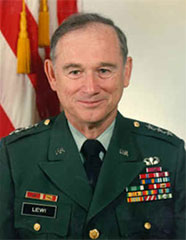
Lieutenant General, Retired
Kenneth E. Lewi
Colonel of the Corps, Emeritus
June 1993 – June 1996
Lieutenant General Lewi was commissioned a Second Lieutenant in the Quartermaster Corps after completion of Reserve Officer Training at Texas A&M University. His civilian education includes a Master of Business Administration degree from the University of Alabama. General Lewi's most recent assignment before retirement was as Commander of the 21st Theater Army Area Command (TAACOM) in Kaiserslautern, Germany. The 21st TAACOM was the Army's largest forward-deployed logistics command, responsible for over 33,000 personnel and budgeted for more than $1 billion per year. General Lewi's other commands included 46th Support Group, Fort Bragg, North Caroline; US Army Troop Support Command, St. Louis, Missouri; 3d Support Command, Frankfurt, Germany; 23d Supply and Transportation Battalion, Vietnam; and Support Battalion, 196th Infantry Brigade, Vietnam.
General Lewi's awards and decorations include the Distinguished Service Medal (with Oak Leaf Cluster), the Legion of Merit (with Oak Leaf Cluster), the Bronze Star Medal, the Meritorious Service Medal (with Oak Leaf Cluster), the Air Medal, the Joint Service Commendation Medal, and the Army Commendation Medal. He also earned the Parachutist Badge, the Rigger Badge, and the Army General Staff Badge.
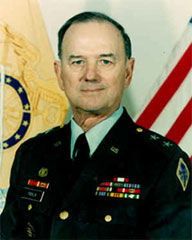
Major General, Retired
Joseph E. Pieklik
Colonel of the Corps, Emeritus
June 1988 – June 1993
Major General Joseph E. Pieklik enlisted in the US Army immediately after Pearl Harbor, graduated from Quartermaster Officer Candidate School and was commissioned Second Lieutenant in December 1942. During more than 32 years of active duty service, he held a wide variety of key logistical command and staff assignments at home and abroad. Prior to his retirement in 1975, he commanded the US Army Tank Automotive Command, Warren, MI. Major General Pieklik was the first Honorary Colonel of the Quartermaster Regiment; he was installed on 25 February 1988 and served until 26 March 1993.
This page was last updated on: September 14, 2021
